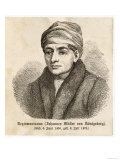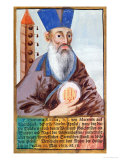|
|
|
|
|
Johannes Müller von Königsberg, “Regiomontanus”
b. 6-6-1436; Bavaria
d. 7-6-1476
Regiomontanus (L. = from King's mountain) was a late Middle Ages mathematician, astronomer and astrologer.
|
|
|
|
|
|
|
Bernhard Riemann
b. 9-17-1826; Kingdom of Hanover (Germany)
d. 7-20-1866; Italy
Bernhard Riemann contributed to analysis and differential geometry which lead to the development of general relativity. Riemann geometry (compared to Euclidean geometry) describes higher dimensions.
|
|
|
|
Julia Robinson
b. 12-8-1919; St. Louis, MO (raised in California)
d. 7-30-1985; Oakland
Mathematician Julia Robinson is best known for her work on decision problems and Hilbert's Tenth Problem.
|
|
|
|
Bertrand Russell
b. 5-18-1872; Trellech, Monmouthshire, Wales
d. 2-7-1970; Wales
Social reformer and pacifist Bertrand Arthur William Russell was a philosopher, logician, mathematician, and historian. He was awarded the 1950 Nobel Prize in Literature “in recognition of his varied and significant writings in which he champions humanitarian ideals and freedom of thought”.
Russell collaborated with Alfred North Whitehead on Principia Mathematica, an attempt to ground mathematics on logic.
Bertrand Russell quotes ~
• “Three passions, simple but overwhelmingly strong, have governed my life: the longing for love, the search for knowledge, and the unbearable pity for the suffering of mankind. These passions, like great winds, have blown me hither and thither . . . over a deep ocean of anguish, reaching to the very verge of despair.”
• “A stupid man's report of what a clever man says can never be accurate, because he unconsciously translates what he hears into something he can understand.”
• “Government can easily exist without laws, but law cannot exist without government.”
• “If a man is offered a fact which goes against his instincts, he will scrutinize it closely, and unless the evidence is overwhelming, he will refuse to believe it. If, on the other hand, he is offered something which affords a reason for acting in accordance to his instincts, he will accept it even on the slightest evidence. The origin of myths is explained in this way.”
• “Science may set limits to knowledge, but should not set limits to imagination.”
• The Autobiography of Bertrand Russell
|
|
|
|
Mary Fairfax Somerville
b. 12-26-1780; Scotland
d. 11-28-1872; Naples, Italy
At a time when women's participation in science was not encouraged, Mary Somerville studied mathematics and astronomy. She translated Pierre-Simon de Laplace's work, invented variables from algebraic math, was the second woman to receive recognition as a scientist in the United Kingdom after Caroline Herschel.
|
|
|
|
|
|
|
|
|
|
|
previous page | top | next
mathematics | mathematicians list | a-b | c | d | e | f-g | h-k | l-m | n | o-p-q | R-S | t-z < numbers
|
|
I have searched the web for visual, text, and manipulative curriculum support materials - teaching posters, art prints, maps, charts, calendars, books and educational toys featuring famous people, places and events - to help teachers optimize their valuable time and budget.
Browsing the subject areas at NetPosterWorks.com is a learning experience where educators can plan context rich environments while comparing prices, special discounts, framing options and shipping from educational resources.
Thank you for starting your search for inspirational, motivational, and educational posters and learning materials at NetPosterWorks.com. If you need help please contact us.
|
|
|



















